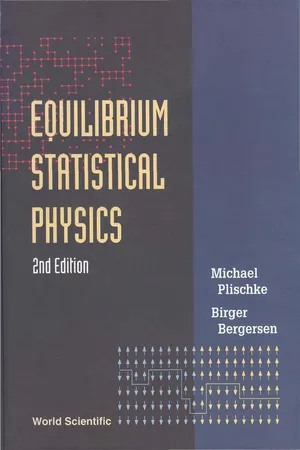
- 536 pages
- English
- PDF
- Available on iOS & Android
Equilibrium Statistical Physics
About this book
This revised and expanded edition of one of the important textbook in statistical physics, is a graduate level text suitable for students in physics, chemistry, and materials science.
After a short review of basic concepts, the authors begin the discussion on strongly interacting condensed matter systems with a thorough treatment of mean field and Landau theories of phase transitions. Many examples are worked out in considerable detail. Classical liquids are treated next. Along with traditional approaches to the subject such as the virial expansion and integral equations, newer theories such as perturbation theory and density functional theories are introduced.
The modern theory of phase transitions occupies a central place in this book. The development is along historical lines, beginning with the Onsager solution of the two-dimensional Ising model, series expansions, scaling theory, finite-size scaling, and the universality hypothesis. A separate chapter is devoted to the renormalization group approach to critical phenomena. The development of the basic tools is completed in a new chapter on computer simulations in which both Monte Carlo and molecular dynamics techniques are introduced.
The remainder of the book is concerned with a discussion of some of the more important modern problems in condensed matter theory. A chapter on quantum fluids deals with Bose condensation, superfluidity, and the BCS and Landau-Ginzburg theories of superconductivity. A new chapter on polymers and membranes contains a discussion of the Gaussian and Flory models of dilute polymer mixtures, the connection of polymer theory to critical phenomena, a discussion of dense polymer mixtures and an introduction to the physical properties of solid and fluid membranes. A chapter on linear response includes the Kubo formalism, the fluctuation-dissipation theorem, Onsager relations and the Boltzmann equation. The last chapter is devoted to disordered materials.
Each chapter contains a substantial number of exercises. A manual with a complete set of solutions to these problems is available under separate cover.
Tools to learn more effectively

Saving Books

Keyword Search

Annotating Text

Listen to it instead
Information
Table of contents
- Contents
- Preface to First Edition
- Preface to the Second Edition
- Chapter 1 Review of Thermodynamics
- Chapter 2 Statistical Ensembles
- Chapter 3 Mean Field and Landau Theory
- Chapter 4 Dense Gases and Liquids
- Chapter 5 Critical Phenomena I
- Chapter 6 Critical Phenomena II: The Renormalization Group
- Chapter 7 Simulations
- Chapter 8 Polymers and Membranes
- Chapter 9 Quantum Fluids
- Chapter 10 Linear Response Theory
- Chapter 11Disordered Systems
- Appendix Occupation number represent at ion
- Bibliography
- Index
Frequently asked questions
- Essential is ideal for learners and professionals who enjoy exploring a wide range of subjects. Access the Essential Library with 800,000+ trusted titles and best-sellers across business, personal growth, and the humanities. Includes unlimited reading time and Standard Read Aloud voice.
- Complete: Perfect for advanced learners and researchers needing full, unrestricted access. Unlock 1.4M+ books across hundreds of subjects, including academic and specialized titles. The Complete Plan also includes advanced features like Premium Read Aloud and Research Assistant.
Please note we cannot support devices running on iOS 13 and Android 7 or earlier. Learn more about using the app